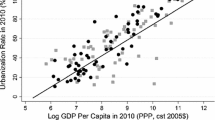Abstract
Despite globalization a progressively increasing economic and financial concentration in the ‘cores’ of the world economy (e.g. EU) as well as the rise of new socioeconomic marginalization of peripheries (e.g. Maghreb and Mashraq) has been observed since the early 1980s. Marginalization has produced its own models of specialization in production which reflect in various countries and regions the needs of the ‘cores’ economy forces. A regional strategy for regional co-operation, so called co-development, is advanced to overcome the current economic and social problems faced by marginalized regions in relation to world economic trends.
Similar content being viewed by others
References
Amato, A. (1993a). From Eurocentrism to Regional Cooperation. EU's Regional Policy in the Mediterranean,The Mediterranean Europe, EU Monitor-FAST Programme 1991–1992, Bruxelles (FOP 344).
Amato, A. (1993b). Job Creation in the Maghreb with a view to a Euro-Maghreb Partnership,2nd Meeting of the Representatives of the Economic and Social Interest Groups of the Countries of the Arab Maghreb Union and the European Community, Tunis, 8, 9 and 10 September, ref. DEL. 1 2nd AMU/EU Meeting, DI 76/93.
Amin, S. (1990a).Delinking. Towards a Polycentric World, Zed Books, London.
Amin, S. (1990b).Maldevelopment, UN University Press, Tokyo.
Amoroso, B. (1992). Is the ‘Scandinavian Model’ an Alternative to Communism in Eastern Europe?,Macroeconomic Theories and Policies for the 1990s, Amoroso, B., Jespersen, J. (ed.), Macmillan, London.
Amoroso, B. (1993a). The Danish Welfare System in Disarray: the Challenge of Globalization,F. Caffè Centre for Southern European Studies. Research Report, n. 2.
Amoroso, B. (1993b). From Dualism to Marginalization — Technologies, Patterns of Industrialization and Development Models,The Mediterranean Europe (with A. Amato), EU Monitor-FAST Programme 1991–1992, Bruxelles (FOP 344).
Amoroso, B., Gomez y Paloma, S. (1993). Triadic Globalization and Regional Scenarios: the Baltic and Mediterranean Regions, F.Caffè Centre for Southern European Studies, Research Report n. 1, Roskilde University.
Amoroso, B., Gomez y Paloma, S., Infante, D., Perrone, N. (1993).Synthesis Report, Marginalization, Specialization and Cooperation in the Baltic and Mediterranean Regions, EU Monitor-FAST Programme 1991–1992, Bruxelles (FOP 343).
Braudel, F. (1981).The Structures of Everyday Life. The Limits of the Possible, Civilization and Capitalism 15th–18th Century, Volume I, Harper & Row, NY [1979].
Braudel, F. (1984).The Perspective of the World, Civilization and Capitalism 15th–18th Century, Volume III, Harper & Row, NY.
Commission of the European Community (1990).Underground Economy and Irregular Forms of Employment (Travail au Noir), Programme for Research and Actions on the Development of the Labour Market, Office for Official Publications of the EU, Luxembourg.
Dallago, B. (1990)The Irregular Economy, Dartmouth, Worcester.
De Bandt, J.,Torre, A. (1992). Elements d'Analyse des Systèmes Productifs dans le Bassin Méditerranéen,People, Industry and Technology in the Mediterranean Europe, EU Monitor-FAST Programme 1991–1992, Bruxelles (FOP 348).
De Bartolo, G. (1992). Some Demographic Aspects of the Countries of the Mediterranean Basin and the Baltic,People, Industry and Technology in the Mediterranean Europe, EU Monitor-FAST Programme 1991–1992, Bruxelles (FOP 348).
Fuà G. (1978). Lagged Development and Economic Dualism,Quarterly Review, Banca nazionale del Lavoro, Roma
Gomez y Paloma, S. (ed.) (1992).Agro-Food Systems and Biotechnology in the Baltic and Mediterranean Regions, EU Monitor-FAST Programme 1991–1992, Bruxelles (FOP 347).
Infante, D. (1992). Industry, Innovation and Regional Markets — Baltic and Mediterranean Scenarios,People, Industry and Technology in the Mediterranean Europe, EU Monitor-FAST Programme 1991–1992, Bruxelles (FOP 348).
Mazoyer, M. L. (1981). Origins and mechanism of reproduction of the regional discrepancies in agricultural development in Europe,European Review of Agricultural Economics, vol. 8-2/3.
Mazoyer, M. L. (1988). Reconfiguration critique des systhèmes de production, paper presented at the conferenceProsectives des desequilibres mondiaux, co-organised by CPE, le GRET, le CIRAD and ORSTOM, Paris.
Meyer, J.B., Raj, K. (with the collaboration of R. Bocco) (1992). Science and Technology Cooperation Between Europe and the Arab World,People, Industry and Technology in the Mediterranean Europe, EU Monitor-FAST Programme 1991–1992, Bruxelles (FOP 348).
Perrone, N. (1992).European and American Patterns in a Conflictive Development, Centre for Southern European Studies, Roskilde University, Economics & Society, 1, series directed by B. Amoroso.
Perrone, N. (1993).The Wider Europe, EU Monitor-FAST Programme 1991–1992, Bruxelles (FOP 346).
Petrella, R. (1991).Four Analyses of Globalization of Technology and Economy, EU Monitor-FAST Programme, Bruxelles.
Petrella, R., Saussay (de la), P. (1993). Living Together. Reshaping Science and Technology Priorities to Serve the Basic Needs and Aspirations of 8 Billion People, (provisional, non-edited version), paper presented at theEurprospective III, Third European Long-Range Forecasting Conference, Science and Technology for the Eight Billion People by 2020, organised by the EU FAST Programme and Wiesbaden Polytechnic, Wiesbaden, Germany.
UNDP (1992).Human Development Report, NY.
United Nations (1988).Transnational Corporations in World Development, United Nations Centre on Transnational Corporations, New York.
United Nations (1991).World Investment Report. The Triad in Foreign Direct Investment, by the United Nations Centre on Transnational Corporations, NY.
United Nations (1992).World Investment Report. Transnational Corporation as Engines of Growth, by the Transnational Corporations and Management Division, Department of Economic and Social Development, NY.
Wallerstein, I. (1974).The Modern World-Sistem, AP Press, NY and London.
Author information
Authors and Affiliations
Rights and permissions
About this article
Cite this article
Amoroso, B., Gomez y Paloma, S. Globilization and regional scenarios: EU and mediterranean from marginalization to co-development. AI & Soc 8, 186–196 (1994). https://doi.org/10.1007/BF02064282
Issue Date:
DOI: https://doi.org/10.1007/BF02064282




